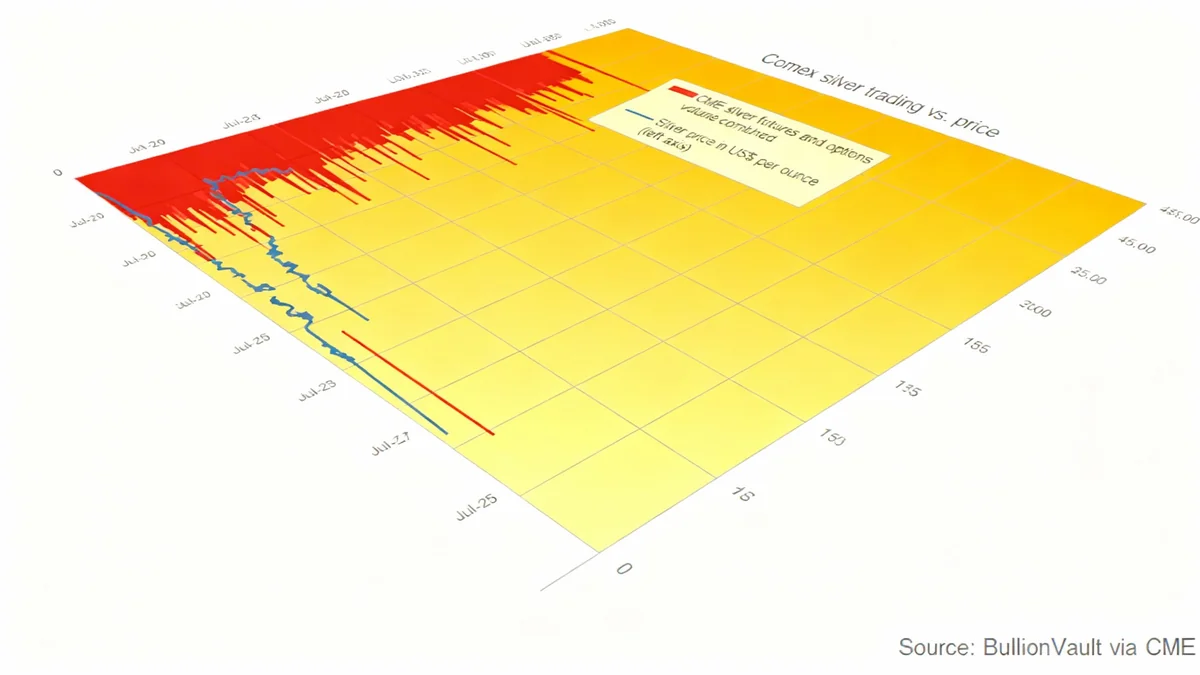U.S. stock futures pointed to a lower open on Friday morning, following a sell-off in the previous session driven by renewed concerns about the health of regional banks. The decline reflects growing investor anxiety over lending practices and the potential for further financial instability.
Futures contracts for the Dow Jones Industrial Average indicated a 1% drop at the open. S&P 500 futures were down 1.3%, and Nasdaq 100 futures fell by 1.5%, signaling broad-based market weakness ahead of the trading day.
Key Takeaways
- U.S. stock futures fell sharply, with the Dow, S&P 500, and Nasdaq 100 all indicating significant losses.
- The sell-off was triggered by concerns over bad loans disclosed by regional banks Zions and Western Alliance.
- The SPDR S&P Regional Banking ETF (KRE) dropped over 6% in the previous session, marking its fourth consecutive weekly decline.
- The negative sentiment spread to European markets, with the European Stoxx Banks Index falling nearly 3%.
- Broader market pressures include trade policy uncertainty, high valuations from the AI boom, and a U.S. government shutdown halting key economic data.
Regional Bank Stocks Trigger Market Sell-Off
The negative sentiment in the market follows a difficult session on Wednesday, where all major U.S. stock indexes closed lower. The Dow Jones Industrial Average lost 301.07 points, a decline of 0.7%. The S&P 500 dropped 0.6%, and the Nasdaq Composite fell 0.5%.
The primary catalyst for the downturn was a late-session slide in financial stocks. Investor confidence was shaken after regional lenders Zions Bancorporation and Western Alliance Bancorporation disclosed issues with bad loans. These announcements raised fears about lax lending standards across the sector.
Banking ETF Under Pressure
The SPDR S&P Regional Banking ETF (KRE), a key barometer for the health of regional lenders, experienced a significant drop, falling more than 6% during Wednesday's trading. This marked the fund's fourth straight week of losses, highlighting persistent investor nervousness.
Concerns in the banking sector have been escalating, particularly after the recent bankruptcies of two companies linked to the auto industry. Investors are now closely watching for signs that credit quality may be deteriorating more broadly.
Individual Company Movements and Market Movers
Several individual companies saw significant price movements in after-hours trading. Oracle shares slipped 4.7% after the software company provided its long-term financial outlook to analysts. Similarly, shares of Interactive Brokers Group fell more than 5%, even after the company reported strong quarterly earnings results.
The pharmaceutical sector also faced headwinds. Drugmakers Eli Lilly and Novo Nordisk saw their stocks decline after President Donald Trump indicated that his administration was negotiating for substantially lower prices on their popular obesity drugs during a briefing on fertility treatments.
Investors are now looking ahead to Friday's earnings reports from other regional banks, including Comerica and Fifth Third, for further insight into the sector's financial condition.
A Market Facing Multiple Headwinds
Beyond the immediate banking concerns, the market is navigating several other significant challenges. These include ongoing tensions related to global trade and tariff policies, questions about elevated stock valuations driven by the artificial intelligence boom, and the economic impact of a U.S. government shutdown.
European Markets Follow US Lower
The credit concerns originating in the U.S. banking sector have spread across the Atlantic, impacting European equity markets. On Friday, European stocks were trading firmly in negative territory as investors reacted to the developments.
The financial sector was hit particularly hard. The European Stoxx Banks Index was down nearly 3% in early trading. This index tracks the performance of major banking institutions across the continent.
Key European Banks Decline
Among the notable decliners in the European banking sector were several major institutions. The list of poor performers included:
- Sabadell (Spain)
- Deutsche Bank (Germany)
- Barclays (United Kingdom)
This synchronized downturn in both U.S. and European bank stocks underscores the interconnected nature of the global financial system and how quickly concerns in one region can affect another.
Broader Economic Uncertainty Looms
Adding to the market's unease is the ongoing U.S. government shutdown, which has entered its third week. The shutdown has caused an indefinite suspension of crucial economic data releases from federal agencies, such as the Bureau of Labor Statistics and the Census Bureau.
The lack of official economic data makes it more difficult for investors and policymakers to accurately assess the health of the economy, creating an environment of heightened uncertainty.
Without this data, market participants are left with an incomplete picture, making it challenging to make informed decisions about investments and economic forecasts. This information vacuum contributes to the overall cautious tone in the market.
As the trading week concludes, investors will be monitoring earnings reports from the financial sector and any further developments related to credit quality and lending standards. The market's direction will likely depend on whether these banking fears subside or intensify.





